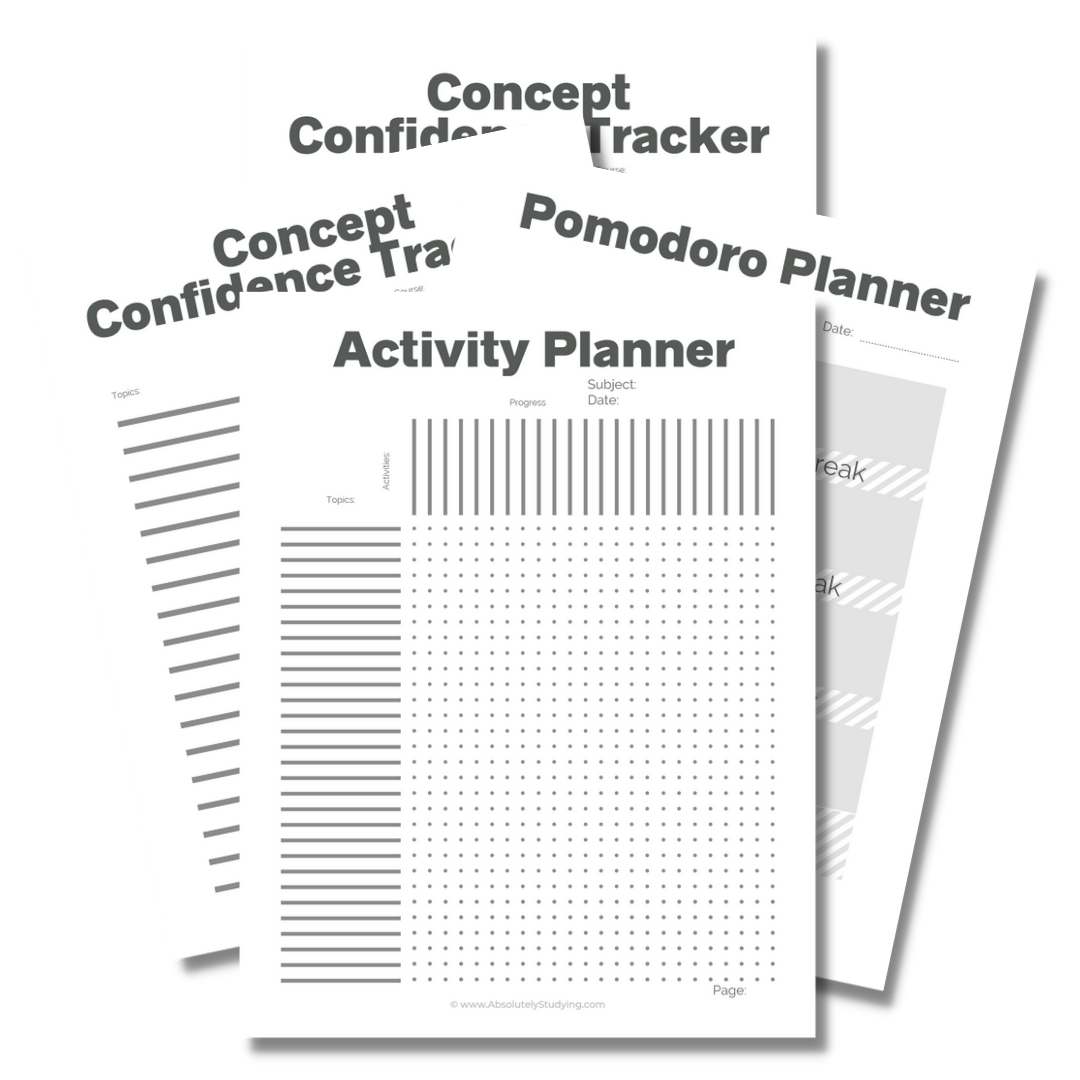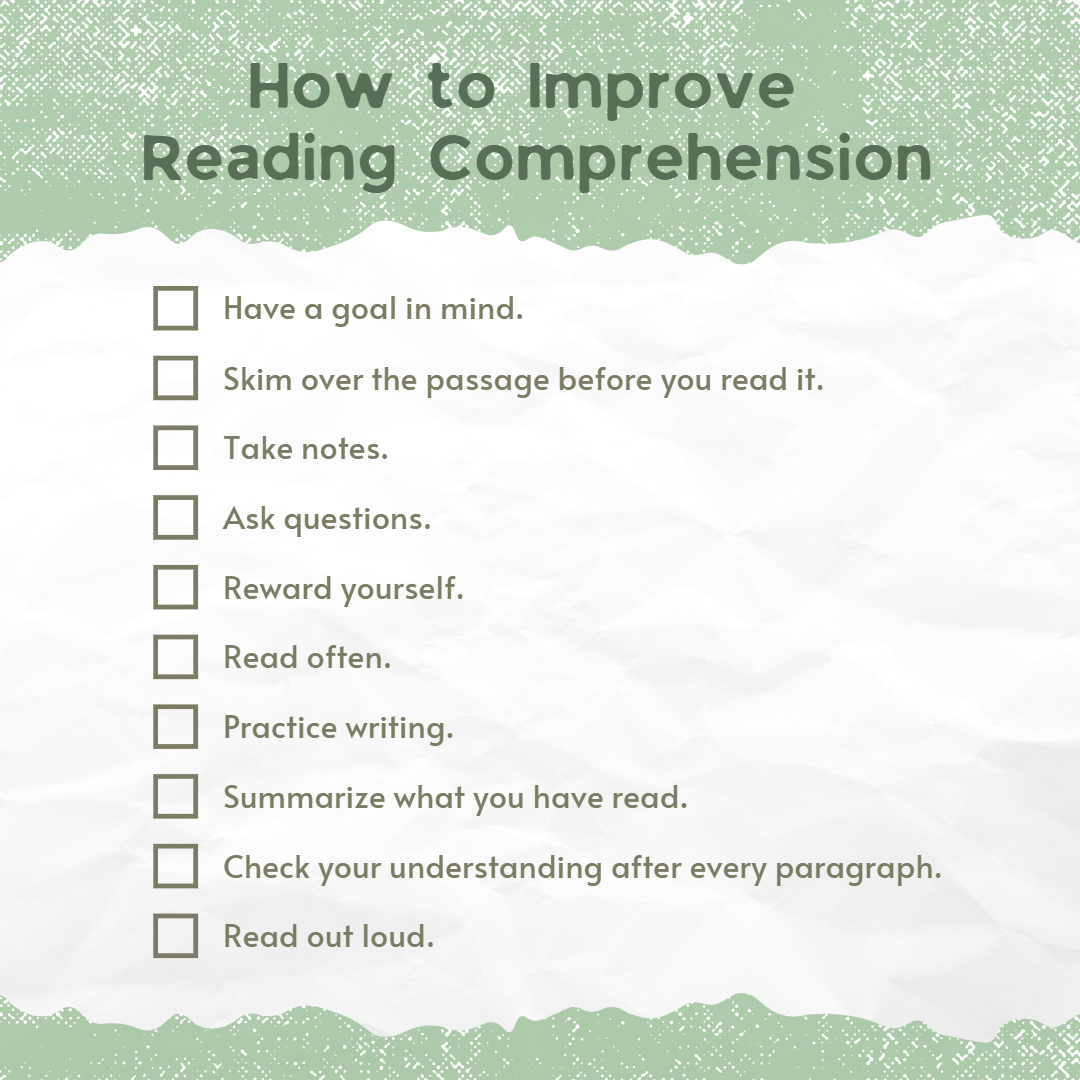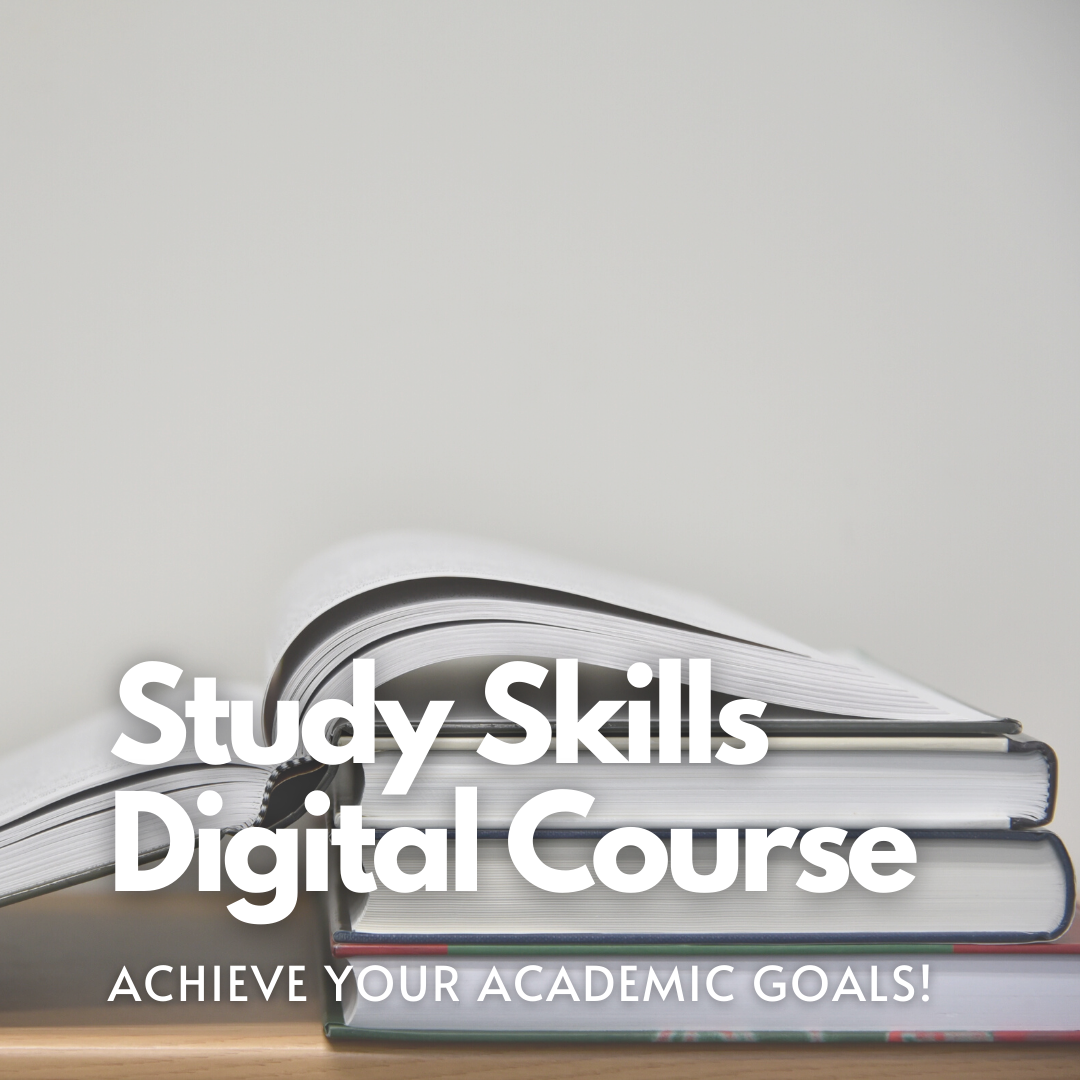How to Improve your Reading Skills and Understand Better the First Time
How to Sharpen Your Reading Skills and Boost Understanding Instantly
Improve reading comprehension skills while you study and level up the efficiency of each session.
Everything you need for the semester you want!
This bundle includes:
The Syllabus Study Planner
The Pomodoro Planner
A Confidence Tracker
A Q&A planner
The “Get Organized Checklist”
and more!
This workbook is full of super useful resources that can be applied to every aspect of your day.
* Disclaimer * Some of the posted links are affiliate programs. By clicking these links, I may receive monetary compensation. This will not alter the price or change the buyer's experience.
You probably don’t think about reading comprehension very often. Once you’ve left elementary school, you never really focus on how to improve your reading skills. The entire education system basically assumes that once you learn how to read, you will just be able to keep up.
Unfortunately, this is not really true. There is a big gap in difficulty between high school and university-level textbooks. Students often struggle to keep up once they enter post-secondary. This can lead to them avoiding reading their texts even though it’s critical they do.
I had this problem. Growing up, I loved to read. I was that kid with her nose in a book on her walk home. Looking back, it probably wasn’t that safe, but I couldn’t help it. I adored getting lost in the fantasy worlds of the books I read. It was my opportunity to escape the reality of my life and go on amazing adventures.
When I got to university, I really struggled with reading. It was confusing to me because I read all the time. Unfortunately, my novels did not prepare me for how technical university textbooks are, which was really discouraging. I found myself hesitant to pick them up because of my difficulties with reading them.
It’s crucial that you read your textbook in university. You can get so much information from the text that you just don’t get in lectures. The detail is much deeper and can be read over repeatedly until you really understand the concept.
Today we will discuss strategies to improve reading comprehension. This can help you to understand the concepts better the first time you read them. It’s not just about how to get better at reading. This is how to elevate your understanding of the material.
Don’t forget to pick up our free study planner and activity tracker. It will help you to create a study strategy for your entire semester. Make a plan to improve your study habits and GPA with a simple tracking system.
Download your free study planner and activity tracker.
Everything you need for the semester you want!
What is Reading Comprehension, and Why Does It Matter?
Reading comprehension relates to how well you can understand and interpret the material as you read it. This means you can visualize a process or make connections with relevant concepts.
Strategies to improve reading comprehension are essential to college and university students because they will increase the efficiency of your study sessions. When you understand the nuances of a topic the first time you read it, you will be better able to retain and work with the information. You can also more easily identify similar concepts and connect them.
Some practices used to get better at reading comprehension are also excellent study activities. So, you can actually use them while studying to improve your reading skills and understanding of the class material.
How to Improve Reading Comprehension
To understand and retain the information, you have to remember and understand it first. This is not always as easy as it seems. Especially when you are reading an extremely dry or technical textbook. Adding specific techniques to help you better understand what you are reading will help you improve your reading comprehension and recall of the material.
How many times have you read a page and forgotten to pay attention? I do it all the time. I will be reading away, sometimes even highlighting important concepts. Suddenly, I am three pages in and realize I have been on autopilot.
I don’t remember anything that I’ve just read. I completely blanked and failed to pay attention. These tips are going to help you avoid this fate. They will help you to prime, remember, and make sure you understand the text you are about to read, while the final tip will help you stay motivated and keep it up!
How to Sharpen Your Reading Skills and Boost Understanding Instantly
I get distracted easily, so I have to find ways to stay focused on my study activities. Incorporating these tasks into reading sessions helps me to stay focused.
Have a goal in mind every time you sit down to read.
When you sit down to read, have a definite end goal for how much you need to cover. This goal should be loosely based on the amount of time you can spend and not the actual amount you have to read.
If you have a large portion of text you have to get through, break it down into sub-sections. For example, if you need to read an entire chapter, break it down into sub-chapters or even headings. Go through each of these steps for every section and take a short break between them.
Try using the Pomodoro method to guide your breaks to avoid getting burnt out for focusing too long. This will ensure you have a few moments after each 25-minute focus interval. These breaks will keep you refreshed for a long reading session.
Skim over the passage before you read it.
Once you have identified a section of the text, skim over it briefly. Don’t read any of the text, but just let your eyes map out what you are about to read.
Look over all of the diagrams and read the captions. As you pause, try to test your understanding by following the diagrams or reading charts. Think of what you will learn and if you already have the foundational knowledge to understand the flow of these diagrams.
Read the bold words and try to figure out what they mean without any context. Are you familiar with these words? Do they remind you of any others you have encountered in the past? Do they relate to nearby diagrams or charts?
Try to guess what they mean based on their sound and the sentence they have been placed in. Right now, we are priming ourselves to connect the concepts we are about to read about with ideas we have already learned. This is an excellent time to make an effort to link what we already know to what we are learning.
This will help us to make mental associations while we read the text for the first time. This will establish a solid foundation for building our understanding of these new concepts.
Memory retention is only one aspect of learning. You are unlikely to remember everything you read the first time you go over it. But by adding these extra steps, you will improve your ability to synthesize this new information with existing knowledge you already understand. Linking it to those concepts and making them easier to recall.
Finally, look at the charts and tables. Can you understand them? Try to figure out what they might tell you and how it relates to the topic. This is another priming exercise that will help you to remember the information before you even read it.
Take notes as you read through your textbook.
Now we finally get to start reading. As you read through the section you have chosen, take notes. Make sure to focus on essential concepts and terminology.
Don’t write everything down. Instead, try to pick out only the important bits of the paragraphs and only take those down.
Use your own words. It is much easier to remember your words than someone else’s. Don’t try to memorize the words in the textbook. These are usually stuffy and technical anyway. At least put the definition into simple or common words rather than using long, dry, technical terms.
The first line of a paragraph is usually the most important. The following sentences will likely expand on the first. Decide if you want your notes to be on the facts or the details, which will point you toward what you want to write down.
This is also a great place to stop yourself and test your understanding. Read the first sentence, then try to anticipate what the rest of the paragraph will say. Can you imagine the process they are about to discuss?
As you read it, check that what you imagined is precisely as they described it. You can also take this time to write out questions to test yourself later.
Writing by hand might seem cumbersome, but it really helps with learning. It takes several processes to write.
First, you have to read the information.
Then you have to interpret it,
Next, you formulate your own words.
Now you have to tell your hand to write it.
You naturally read while you write.
All these extra steps enhance your understanding and make you more likely to remember these details during test time. Each of these steps creates a mental association that will help you retrieve the information when needed.
Check out this article for more about mental associations and their making.
Ask questions as you read and seek out the answers.
This is a practice you can do before and after reading your section. Make a list of questions based on the diagrams, headings, and bold terms you skimmed over. You can also add things you hope to learn or would like explained in more detail.
As you read, try to find answers to your questions. Write down what you learn as you go through the process. If some aspects you feel were not explained well enough, write that down as well.
If there is a piece of information you don’t quite understand, write down why.
What was lacking in the explanation?
How could it have been explained better?
What part of the concept are you still struggling with?
Write this all down. It’s possible that later you will forget that you don’t understand this part of the concept. Looking this information up independently will often help the pieces click into place.
Suddenly the whole concept will come rushing together with a level of clarity you had not anticipated. All you needed was to find that missing piece.
These also act as great questions for your practice tests. If you make quizzes while you do your readings, they will be ready for you when you need them. You won’t have to scrape back through your notes to create one.
Finally, make notes about how what you’ve learned differs from your original expectations. Sometimes, when we start reading a chapter, we expect to find one thing, but the focus ends up on something totally different.
Take note of these differences and why you think the textbook chose to focus on what it did. Were the topics introduced foundational to what you thought you were going to learn about? Or was the concept completely different?
Asking yourself questions like this will link the two concepts together, adding yet another mental association to help you retrieve information at test time.
Reward yourself as you reach milestones.
Incentives will help you to stay motivated. Every time you reach one of your reading goals, reward yourself. You can use just about anything that you enjoy as a reward.
Reward yourself with a treat or even a few minutes on social media. Staying motivated to get what you want can help you push through dry text and finish what you started.
It doesn’t have to be after reading an extensive chapter. You can even give yourself a prize after each sub-topic. Small rewards for small milestones can add up to significant gains over time.
Positive reinforcement is a powerful motivator. Your brain enjoys rewards, and you should not feel guilty about that.
Study Skills Digital Course
Learn how to create a stress-free, comprehensive strategy!
How to Get Better at Reading in 5 Steps
Read often. This doesn’t just have to be textbooks or other academic readings. Reading fiction, news, or just about anything can help improve reading comprehension.
Practice writing. Writing actually helps with reading. Writing helps to expand your vocabulary and allows you to clarify and better communicate your thoughts.
Summarize what you have read. This also helps you to clarify and communicate your thoughts. This practice goes the extra step of checking that you understand what you have read. Summarizing is one of the best strategies to improve reading comprehension because it directly tests it.
Check your understanding after every paragraph. Stop and make sure you understand what you have just read. If you stop after each section, you can ensure you don’t get too lost. This is especially helpful with extremely technical works like scientific journals or case studies.
Read out loud. This deepens your level of understanding by adding more mental associations. These will help to layer the knowledge by adding additional cognitive processes to the reading method.
When you learn how to improve reading comprehension, you can amplify the efficacy of each study session. This will make your study time more efficient, so you can get more done.
The strategies used to improve reading skills are very similar to those used for studying. They can be integrated seamlessly into each study session to boost your understanding in less time.
This gives you more time to learn new information and synthesize concepts instead of wrestling with your understanding.
You can use our free study planner and activity tracker to create a study strategy for each of your classes. It allows you to track the activities you used to study each topic throughout the semester. Download yours here.
I would like to be transparent so that there are no misunderstandings. As an affiliate, I may earn a small commission from any products linked in this post. This is not a sponsored post, and I was not asked to recommend these products. These are products that I genuinely love and want to share with my audience.









